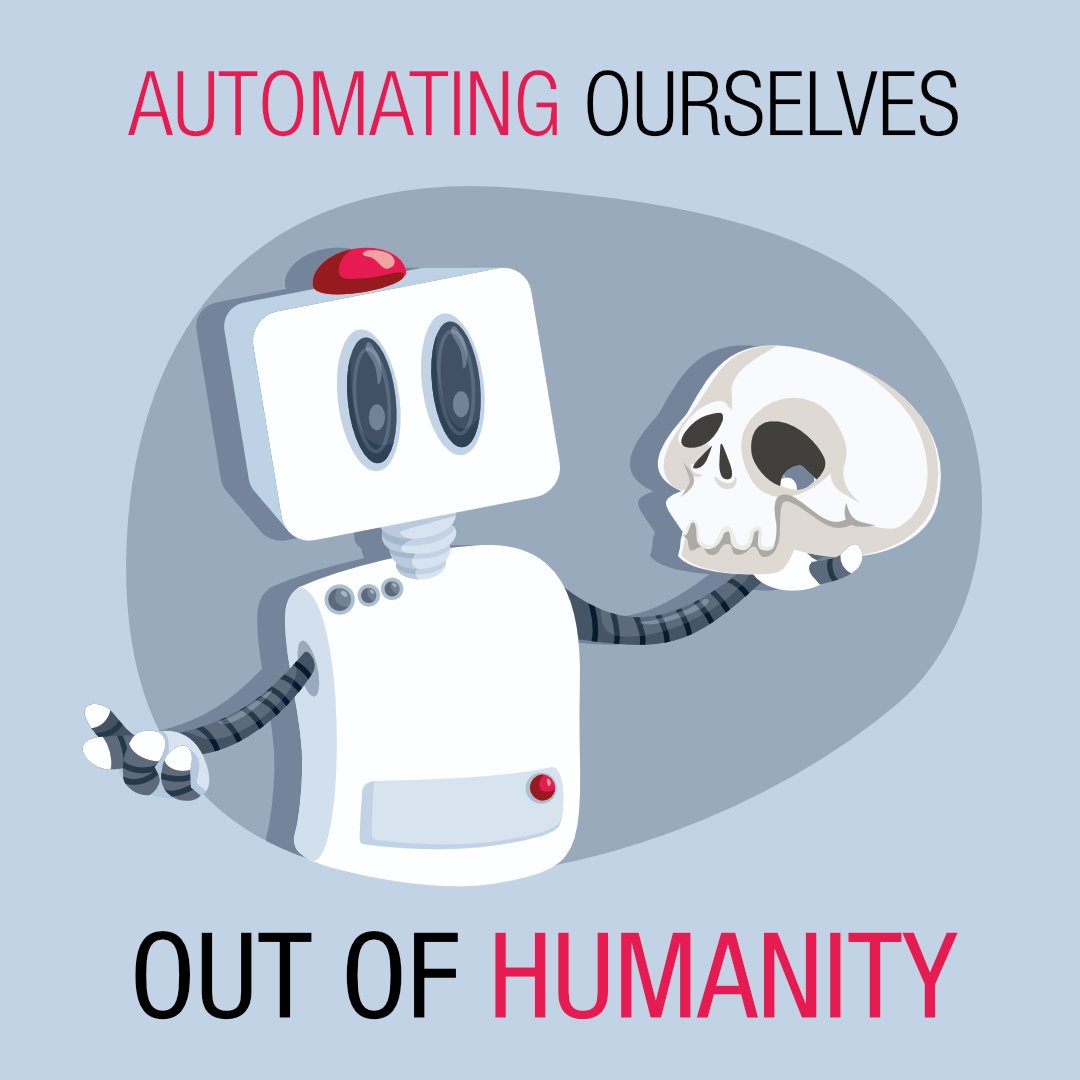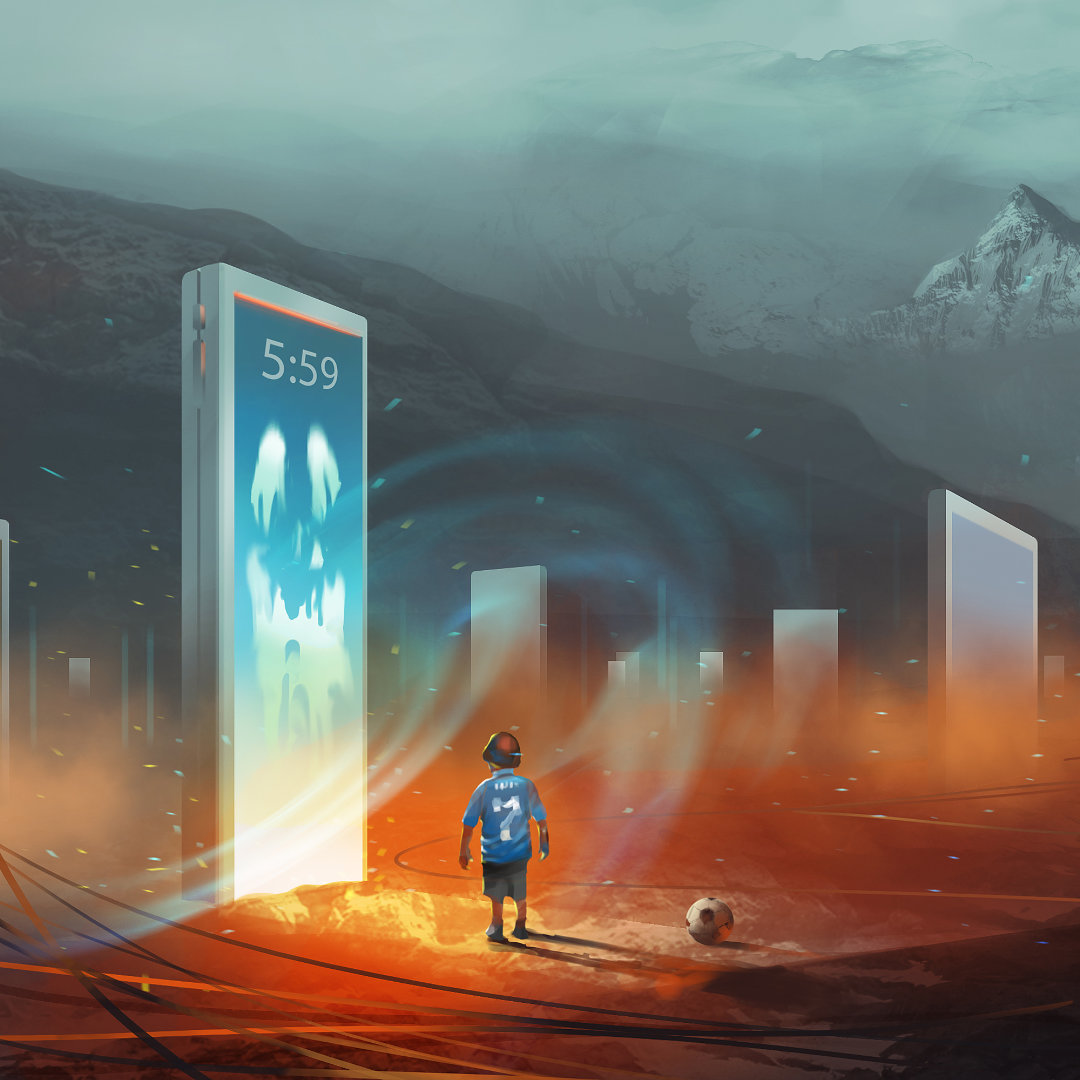
Automating Ourselves Out of Humanity
Estimated Reading Time:
The work world is becoming ever-more connected with technology as almost every industry in the world has an IT contractor/department or is utilizing software to enhance their work. Tech has allowed us all to be more efficient and faster. Automating has streamlined basic tasks. Wonderful! One would think that with these powerful tools clearing up mundane and repetitive tasks, we would have more free time to spend with family and loved ones. Even crazier, maybe we wouldn’t be slaving away at the grind and could pursue more meaningful ambitions. Unfortunately, this isn’t the case. Specifically, in North America, we’re all working more. Customers, clients, and consumers are all wanting more, and they are snippy about it. Why?
Automation
We could point fingers at the fearful rise of star-rating platforms, or the global market of competitors that are creating a cut-throat environment, or we could pull back further and see the more significant issue that encompasses all of this: tech. Technology is ruining our mental stability.
People’s minds are short-circuiting in the consumer-based world and the business workforce (take a look at this fascinating Harvard Business Review article), and are becoming less tolerant. Our expectations have grown out of control as we become joined with our digital world from having mini-computers in our pocket and 24-hour availability to our coworkers with texting. The bombardment of communication through multiple streams, bosses using Big Brother spy software, project management platforms, and data analytics are causing people to tense up with the uncertainty of every move they make. All this bottled up stress is making people lash out like wild animals. Sometimes people are directly aggressive or, more often than not, they act like passive aggressive jerks. This new behaviour is supercharged as we shift into the start of a new decade.
Old World
Pre-2020, we’ve seen a gradual incline in automated services through telephones and plenty of self-service devices online and in person. Then the AI and deep learning started to make an appearance in the decade of 2010. These deep learning machines are supposed to make our lives easier as with every new technological advancement. The ten-year development saw a massive change in workflow found in the business workforce and the consumer world. Capitalism found a new way to optimize and synergize!
New World
Now, post-2019, this gradual incline of convenience rapidly mutated into a sudden mandatory spike. Web optimization. Chatbots. Self-service dashboards. Auto-approval processes. Banks not holding mobile cheque deposits. Project management software. Video conferencing. Faster. Better. Now. The list of adjustments goes on. Even your boss can see that little away icon next to your avatar if you aren’t at your desk.
Automating is Now
Everyone who has been in this game over the past decade is familiar with playing ball in the new digital arena. Those that aren’t, well, they’re in for one hell of a steep learning curve. Learning makes people grumpy, especially since they did all that in high school. There’s clearly no need for personal development anymore. Automation is supposed to do all the heavy lifting for us.
Whether you like it or not, we are all now a part of the digital age. The global pandemic has forced us to sit at home and drop all the corporate culture team development, watercooler conversations, grossly overused boardroom meetings, and the endless pile of make-work projects through casual conversations. With everyone at home, that meant people could only do one thing: work. More often than not, this made people more efficient. Are people happier? That’s a tough question to answer as we experience a once-in-a-lifetime world-altering event (hopefully). Here’s the flip side to the lockdown though, every customer and consumer is at home too.
The death of the office lifestyle and the grazing mall shopper came to a swift and mighty end at the start of the global COVID-19 crisis, and everyone was online. Not everyone is tech-savvy. Some people have trouble managing computers and navigating their interfaces. Other people don’t fit into the streamlined automatic sales funnel These, among others, need to reach out to support.
Automation to the Rescue!
No one can keep up with the rainfall of emails and phone calls. Thus, the increase in mental breakdowns, depression, and anxiety attacks run rampant. How can individuals let alone companies, keep up with the massive increase in customer support? The simple answer: chatbots. They’re not a new concept either; this article from SalesForce gets into the details of chatbots from 2019. The blog shows how many companies were already looking at integrating chatbots before the pandemic. Businesses knew they needed a solution to communicate more as their futile human workers are failing to keep up the increasingly rude demand. Unfortunately, these chatbots aren’t quite there yet. Sure, a number of them have passed the famous Turing Test, but they’re still ridged and script-like. Ultimately these bots are stripping away the personalized professional touch of a human being, and people don’t like them. Clients, customers, and consumers want the human-to-human connection that is increasingly disappearing both in the corporate and consumer world. Automated processes are destroying our humanity towards each other, and we’ve decided to hop on the ride because these companies offer too many conveniences for us to give them up.
Though, it’s not like corporations did an outstanding job and making their employees happy and want to provide top-notch work and service. A lot of jobs are low pay and heavy work. Many people fall under the essential worker category and make minimum wage. If they’re so crucial, why do they make next to nothing? Or for jobs requiring post-secondary education, companies will pay you less and chalk it up to ‘adding onto your portfolio’ or ‘internship.’ These aren’t good justifications.
The system has eaten itself. People aren’t that passionate about their work, and companies are replacing them with machines. Machines don’t need an HR department either. The ever-increase of industries melding with technology is going to continue to morph into one gluttonous blob of cold, inhuman, automated nonsense. The fusion has been happening way before 2010, and now we’re living in it. The repercussions of this are brain-dead workers who are so mentally exhausted by the constant flow of data, emails, conference calls, project milestones, management systems, and the usage of fluffy business lingo, causing people to shut down. Frustrated customers want to talk to people. By the time they jump through the chatbot hoops, or the help article labyrinths, or drill into the automated phone menu, the customer is so pissed off that they treat the human being on the other side with little to no respect. Then there are many examples of mental health directly linked to our time spent on social media.
Automating Out of Here
Tech isn’t going anywhere. The new pandemic-spiced decade jolted our entanglement – not in the Jada Pinkett-Smith way – with technology years into the future. We would have gotten here eventually, just at a slower and maybe more controlled approach. We’re here now, and it’s up to us to keep our humanity as we interact less and less with people. There will come a time where every deep learning machine and AI passes the Turing test, and we might not even know if we are ever talking to a human being. If machines happen to evolve in this wishful this way, maybe they can re-teach us how to be loving and compassionate once more, and give our fellow human beings the time to listen to one another, as we want our voices heard.
Until then, remember that you are human, and the people that you finally interact with past the layers of automation, are also human.

About Konn Lavery
Konn Lavery is a Canadian author whose work has been recognized by Edmonton’s top five bestseller charts and by reviewers such as Readers’ Favorite, and Literary Titan.



